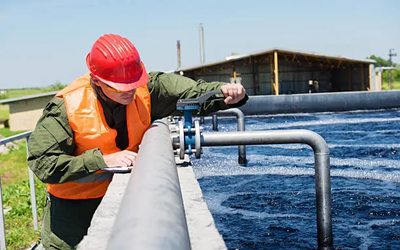Water Supply and Treatment in Rural Communities

₦30000
This course provides a comprehensive understanding of water supply and treatment systems specifically tailored for rural communities. It covers the principles of sustainable water management, the design and implementation of water supply systems, and the various treatment technologies applicable to rural settings. Emphasizing practical solutions, the course prepares participants to address the unique challenges faced by rural areas in accessing safe and clean water. Course Objectives: • Understand the significance of reliable water supply in rural development. • Explore different water supply sources and treatment methods. • Analyze the challenges and opportunities in rural water management. • Develop skills for designing and implementing water supply and treatment systems. This course offers an in-depth exploration of the methodologies, technologies, and management practices necessary for effective water supply and treatment in rural communities. It aims to equip participants with the knowledge and skills to assess water resources, design sustainable systems, implement treatment solutions, and engage communities in water management initiatives. ________________________________________ Course Outline: Module 1: Sources of Water Supply • 1.1 Overview of Water Sources o Types of water sources: Surface Water: Rivers, lakes, reservoirs Groundwater: Aquifers, boreholes, springs Rainwater Harvesting: Techniques for capturing and storing rainwater Desalination (where applicable): Processes and technologies for saline water conversion • 1.2 Assessing Water Sources o Techniques for evaluating water availability and quality o Hydrological modeling and resource mapping o Community involvement in resource assessment Module 2: Water Supply Processes • 2.1 Water Supply System Design o Components of water supply systems: Source development (wells, boreholes, surface intakes) Storage (tanks, reservoirs) Distribution (pipes, pumps) o Design principles for rural systems: Gravity-fed vs. pumped systems Cost-effectiveness and sustainability • 2.2 Water Demand Assessment o Estimating water demand for communities o Factors influencing water usage patterns o Strategies for water conservation and efficiency Module 3: Water Treatment Processes • 3.1 Importance of Water Treatment o Public health implications of untreated water o Water quality standards and regulations • 3.2 Conventional Treatment Methods o Coagulation and Flocculation: Processes to remove suspended solids o Sedimentation: Gravity separation of solids o Filtration: Types of filters (sand, activated carbon, membrane) o Disinfection: Chemical (chlorination) and physical methods (UV treatment) • 3.3 Innovative Treatment Technologies o Bio-sand Filters: Design and operation o Solar Disinfection: Utilizing sunlight for disinfection o Constructed Wetlands: Natural treatment systems for wastewater o Electrochemical Treatment: Emerging technologies for rural settings Module 4: Purposes of Water Supply and Treatment • 4.1 Ensuring Public Health o Role of safe water in preventing waterborne diseases o Case studies of health impacts from poor water quality • 4.2 Supporting Economic Development o Contribution of reliable water supply to agriculture, industry, and livelihoods o Water's role in educational outcomes and gender equity • 4.3 Environmental Sustainability o Balancing water supply needs with ecosystem preservation o Techniques for sustainable water resource management Module 5: Data Analysis for Water Management • 5.1 Data Collection Methods o Quantitative and qualitative data collection techniques o Use of surveys, water quality testing, and community feedback • 5.2 Data Management and Analysis o Software tools for data analysis (Excel, GIS, R) o Analyzing water quality data to inform treatment decisions o Monitoring and evaluating water supply systems for performance and sustainability Module 6: Technologies in Water Supply and Treatment • 6.1 Water Supply Technologies o Advanced pumping technologies (solar, submersible) o Smart water distribution systems (sensors, IoT applications) o Automated monitoring systems for water quality • 6.2 Water Treatment Technologies o Overview of emerging treatment technologies (nanotechnology, bioengineering) o Integration of renewable energy in water treatment processes o Case studies of innovative technologies in rural settings Module 7: Community Engagement and Capacity Building • 7.1 Importance of Community Involvement o Strategies for engaging communities in water supply projects o Training community members in system operation and maintenance • 7.2 Building Local Capacity o Developing leadership and management skills within communities o Partnerships with local organizations and stakeholders Module 8: Policy Framework and Sustainability • 8.1 Water Governance and Policy o Overview of national and local water policies o Regulatory frameworks governing water supply and treatment • 8.2 Sustainability Practices o Strategies for ensuring the long-term sustainability of water projects o Integrating climate resilience into water management planning ________________________________________ Assessment Methods: • Quizzes and Exams: Testing knowledge of course materials and concepts. • Group Projects: Collaborative projects designing water supply and treatment systems for hypothetical rural communities. • Case Study Analysis: Examination of successful and unsuccessful water projects. • Practical Assignments: Hands-on activities related to data collection, water quality testing, and system design. Target Audience: This course is designed for water resource managers, environmental engineers, community leaders, NGOs, and students interested in water supply and treatment in rural communities. It aims to equip participants with the necessary skills to contribute effectively to rural water management and sustainability. Course Duration: • Total Duration: 8 weeks • Format: Blended learning (online and in-person sessions) • Weekly Commitment: 3-4 hours of lectures, readings, and practical work By the end of this course, participants will be equipped with practical knowledge and skills to improve water supply and treatment practices in rural communities, contributing to enhanced public health, economic development, and environmental sustainability.
Learn more
 0
0 